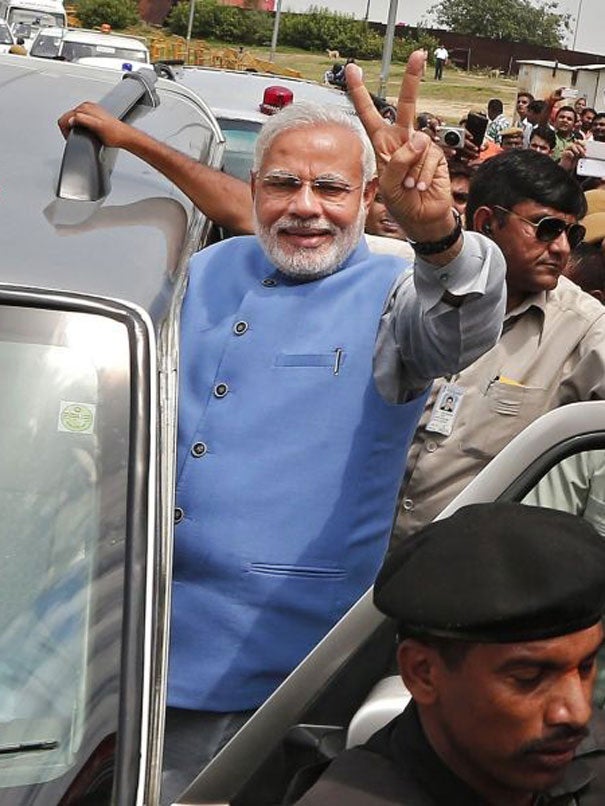India election results 2014: Hero's welcome for Narendra Modi as thousands greet next prime minister on victory tour
India's next Prime Minister is in Delhi to form his new government

India's next prime minister received a hero’s welcome as he arrived in the nation’s capital today and held his first meeting with senior colleagues since yesterday’s election victory. Narendra Modi said the win was not his but belonged to the people who had worked for his victory – the scale of which had surprised everyone.
Thousands of people turned out to see Mr Modi drive from the airport to the headquarters of his Bharatiya Janata Party in the centre of Delhi. There, a modest crowd of supporters and party workers cheered and sang. A machine pumped thousands of flowers over the crowds and the warm air was fragrant with marigolds and roses.
“This victory should not be put under the name of Modi. It should be put under the name of the BJP,” he said, standing on a stage outside the BJP headquarters. “This has only been possible because of the hard work and dedication of party activists and party workers.”
Mr Modi’s BJP by itself is expected to collect 284 seats and will total 339 when the seats of its traditional allies are included. The scale of the victory has not been seen since the election of 1984. The ruling Congress, by contrast, is likely to be reduced to a humiliating 44 seats, its lowest ever.
Mr Modi, who had been boycotted by the West for a decade following massacre of hundreds of Muslims in Gujarat in 2002, campaigned predominantly on issues of development and anti-corruption. His slick, energetic campaign stood in sharp contrast to the faltering efforts of the outgoing Congress party.
“People have started to think about development. They have given their vote without thinking about caste or religion,” said Rana Hinamu, a 29-year-old businessman from Bihar. “Young people want change in the development sector.”
Earlier, India’s outgoing premier, Manmohan Singh, tendered his resignation to the country’s president, Pranab Mukherjee. He will remain in a caretaker capacity until Mr Modi is officially sworn in the coming days.
Mr Singh, an economist often credited helping kickstart India’s economic transformation back in 1991, served as prime minister for ten years. But during his second term in particular, he was seen as being over-ruled and sidelined by the Congress party president, Sonia Gandhi, and his stature diminished.
Read more: How will India change?
Congress party admits defeat
Modi vows to work for development
In a final televised address to the nation, he said he was forever grateful that as a poor child, born in what is now Pakistan, he was able to rise to high office. ‘My life and tenure in office is an open book,” he said. “I have always tried to do my best in serving this great nation of ours.”
In the coming days, Mr Modi, who on Saturday evening flew to Varanasi, one of two constituencies he contested and the one he will keep, will spend time on the formation of his cabinet and the formulation of his first policy steps.
Indian elections - victory for Narendra Modi
Show all 12Mr Modi has kept his cards tightly to his chest, though there is speculation that Arun Jaitley, a BJP leader in the upper house of the parliament, could be made finance minister, despite losing his attempt to win a seat in the lower house. There is also speculation Mr Modi might surprise people by naming Sushma Swaraj, a leader in the lower house, as India’s first woman defence minister. Veteran leader LK Advani could be made Speaker of the House.
Other key posts to fill will be those of home minister and national security adviser. There has been repeated speculation in the media about what roles will be taken by Rajnath Singh, president of the BJP, and Amit Shah, Mr Modi’s trusted aide and a man facing three murder charges, who is considered responsible for the massive victory in Uttar Pradesh, where the BJP won 72 seats.
In the first 100 days of office, Mr Modi is expected to take several quick steps that he believes could help boost the economy and make things easier for businesses. Rajni Bakshi of the Indian Council on Global Relations, said Mr Modi might address labour laws, considered too restrictive by business leaders, and make it easier to hire and fire people. He may also push through environment clearances for industrial projects.
Yet she said, Mr Modi might take his time before addressing some of the trickiest areas, including foreign direct investment in retail. “There are some tough issues that still need work,” she said. “He is not just going to plunge in. He will be more savvy.”
In a first, early sign of the fall-out of Mr Modi’s victory, Nitish Kumar, chief minister of the north Indian state of Bihar, resigned from position after his party did very badly. Mr Kumar’s Janata Dal United had once been an ally of the BJP but Mr Kumar split following the ascendance of Modi.
Mr Kumar’s party bagged just two seats. By contrast, Mr Modi and his allies secured 31 out of 40 seats in the state. “I respect the mandate of the people,” Mr Kumar said.
Subscribe to Independent Premium to bookmark this article
Want to bookmark your favourite articles and stories to read or reference later? Start your Independent Premium subscription today.

Join our commenting forum
Join thought-provoking conversations, follow other Independent readers and see their replies